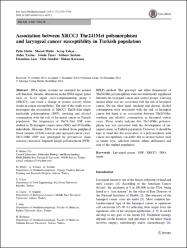| dc.contributor.author | Mutlu, Pelin | |
| dc.contributor.author | Mutlu, Murad | |
| dc.contributor.author | Yalcin, Serap | |
| dc.contributor.author | Yaylaci, Atilay | |
| dc.contributor.author | Unsoy, Gozde | |
| dc.contributor.author | Saylam, Guleser | |
| dc.contributor.author | Akm, Istemihan | |
| dc.date.accessioned | 2019-11-24T20:59:00Z | |
| dc.date.available | 2019-11-24T20:59:00Z | |
| dc.date.issued | 2015 | |
| dc.identifier.issn | 0937-4477 | |
| dc.identifier.issn | 1434-4726 | |
| dc.identifier.uri | https://dx.doi.org/10.1007/s00405-014-3435-2 | |
| dc.identifier.uri | https://hdl.handle.net/20.500.12513/3197 | |
| dc.description | WOS: 000364507300026 | en_US |
| dc.description | PubMed ID: 25510985 | en_US |
| dc.description.abstract | DNA repair systems are essential for normal cell function. Genetic alterations in the DNA repair genes such as X-ray repair cross-complementing group 3 (XRCC3), can cause a change in protein activity which results in cancer susceptibility. The aim of this study was to investigate the association of XRCC3 Thr241Met single nucleotide polymorphism (SNP), smoking and alcohol consumption with the risk of laryngeal cancer in Turkish population. The frequencies of Thr241Met SNP were studied in 58 laryngeal cancer cases (SSC) and 67 healthy individuals. Genomic DNA was isolated from peripheral blood samples of both controls and laryngeal cancer cases. Thr241Met SNP was genotyped by polymerase chain reaction-restriction fragment length polymorphism (PCR-RFLP) method. The genotype and allele frequencies of Thr241Met polymorphism were not statistically significant between the laryngeal cancer and control groups. Carrying mutant allele was not associated with the risk of laryngeal cancer. On the other hand, smoking and chronic alcohol consumption were associated with the risk of laryngeal cancer but there is no association between Thr241Met, smoking and alcohol consumption in laryngeal cancer cases. These results indicate that Thr241Met polymorphism was not associated with the development of laryngeal cancer in Turkish population. However, it should be kept in mind that the association of a polymorphism with cancer susceptibility can differ due to several factors such as cancer type, selection criteria, ethnic differences and size of the studied population. | en_US |
| dc.description.sponsorship | Diskapi Yildirim Beyazit Training and Research Hospital BAP FoundationDiskapi Yildirim Beyazit Training & Research Hospital [41/3] | en_US |
| dc.description.sponsorship | This study was supported by Diskapi Yildirim Beyazit Training and Research Hospital BAP Foundation (# 41/3). The authors of this study declare that they have no conflict of interest. | en_US |
| dc.language.iso | eng | en_US |
| dc.publisher | SPRINGER | en_US |
| dc.relation.isversionof | 10.1007/s00405-014-3435-2 | en_US |
| dc.rights | info:eu-repo/semantics/closedAccess | en_US |
| dc.subject | Laryngeal cancer | en_US |
| dc.subject | SNP | en_US |
| dc.subject | XRCC3 | en_US |
| dc.subject | DNA repair | en_US |
| dc.title | Association between XRCC3 Thr241Met polymorphism and laryngeal cancer susceptibility in Turkish population | en_US |
| dc.type | article | en_US |
| dc.relation.journal | EUROPEAN ARCHIVES OF OTO-RHINO-LARYNGOLOGY | en_US |
| dc.contributor.department | Kırşehir Ahi Evran Üniversitesi, Mühendislik-Mimarlık Fakültesi, Gıda Mühendisliği Bölümü | en_US |
| dc.identifier.volume | 272 | en_US |
| dc.identifier.issue | 12 | en_US |
| dc.identifier.startpage | 3779 | en_US |
| dc.identifier.endpage | 3784 | en_US |
| dc.relation.publicationcategory | Makale - Uluslararası Hakemli Dergi - Kurum Öğretim Elemanı | en_US |


















